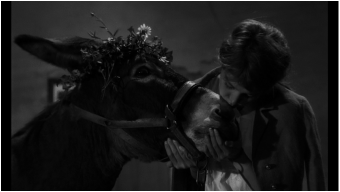
As an introduction to Bresson's work, the first thing that jumps out in Au Hasard Balthazar is how deeply Catholic its philosophy is. Neither Marie nor Balthazar can catch a break, with her playing the part of the prodigal daughter and he in the role of Job. Their suffering through neglect and abuse is depicted as their lot in life, and they must bear it before exaltation in the next, becoming completely debased in the process. Together, they're the embodiment of the parable of the poor man sitting in heaven, while the rich man is tormented in hell. This kind of dynamic, where suffering is the path to paradise, is ultimately unappealing, but Bresson's depiction of it is somehow uplifting. He's able to convey that a heaven exists in this world, one with room for humans and beasts of burden.
The downside to this approach is that Marie is left as a fairly blank character, passive and reacting to the whims of those around her for the bulk of the film. However, supporting characters are more lively, particularly Gerard, who jumps furthest out of the film. Lafarge's childishly cruel visage makes Gerard a hateful character from his introduction playing dangerous pranks on drivers. Coddled by a relative at his job who overlooks lateness and theft, he strides through the film with dull entitlement, the polar opposite of Marie's passivity. In his more despicable moments, he turns Marie's love for Balthazar against the animal, violently beating him after watching Marie tenderly place a crown of flowers on his head. A schoolyard bully in a man's body, he cannot let anyone enjoy a pleasant moment, and his presence lingers over the film. When he's eventually stuck in hell, Marie would be right to not give him a drop of water to wet his lips from her perch in heaven.
As animal performances go, the donkey or donkeys playing Balthazar turns in a memorable one. There seems to be inflection and intonation behind his well-timed (possible ADR'd) brays. Something's happening behind his eyes, which Bresson is sure to catch in close-up. An interlude at a circus stands out, as Bresson films Balthazar scanning the different animals, locking eyes with grander beasts in the same state of captivity that he is, sharing something in their misery. Other sequences seem to transcend filmmaking techniques, transporting the viewer directly into the world. While pulling a grain cart, Balthazar picks up speed, while Bresson adds more cuts between animal, driver, wheel, and axle. Suddenly, he's broken loose, galloping down the road and back to Marie. While the journey isn't depicted, it's easy to imagine Balthazar making it, stopping to eat some clover and being spooked by a car horn. While Bresson gives Balthazar something like an inner life, it's not an anthropomorphized portrayal, avoiding the cutesiness other filmmakers might indulge in.
More than anything, Au Hasard Balthazar makes the viewer want to go to a farm and watch a donkey laze around all day, happy and content. That a donkey basically steals the film is a feature, not a complaint against the human actors. Bresson's highly acclaimed work is full of life of all sorts, even as we're witnessing some of the lows of human behavior. While the film's ethos is too religious by half, when that ethos is as well communicated as it is here, one can see the appeal. B+
 RSS Feed
RSS Feed